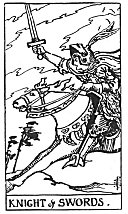
General Book of the Tarot, by A. E. Thierens, [1930], at sacred-texts.com
TRADITION: A military man, officer, master of the sword, master of fencing, warrior. Dispute, war, duel, combat, attack as well as defence; opposition, destruction, ruin, hatred, etc. Also skill, bravery, capacity. Reversed: Incapacity, imprudence, extravagance, foolishness, impertinence, stupidity, industry, crooked tricks.
THEORY: Finally this element on the Fourth and on the Twelfth houses. On account of the former we find of course the armed man under the rule of the Emperor, the military man, soldier, etc., but rather the professional, formerly the hired, troops than the militia, which will rather fall under the same house as the police, and be indicated by the page of swords. Another significance of this card is that of painful memories, suffering by ancient wrongs. In fact war is in all cases, be it private or collective, the phenomenon of the outbreak of some ancient wrong or evil--the wrong of oppression on one side or the evil of desire, rapacity, overflowing force, etc., on the other. So the Knight of swords must bear the significance of the bearer of weapons, which avenge wrongs or serve attacks. The fourth house calls the home and the family, the father in particular, and the
card may well denote something in the nature of avenging family feuds or the honour of the father or the family. Badly aspected it may mean opposition against the power of the father or the Emperor, revolution, which is quite in the line of the grumbling and malcontent nature of the Cancerian of the lower type. It is, however, to be expected that such opposition will be very much hidden, dark, in the background, not open nor very loyal. On account of its relation with the twelfth house this card may also mean a surgeon and operations performed by him, and, in lower types or weaker cases, fraud and destruction of organisms, whatever these may be. It may further relate here to all sorts of bad passions and to degrees of hatred, incapacity, etc.
CONCLUSION: Military man, man of arms, one avenging family or other feuds or wrongs; wrongs avenging themselves; painful memories, distress in the family, afflictions deriving from past events. A surgeon, operation done by same; the knife in old sore. In badly aspected cases hatred, destruction, extravagance, spilling, revolt, insurrection, war, combat, fraud, impertinence, imprudence, etc.